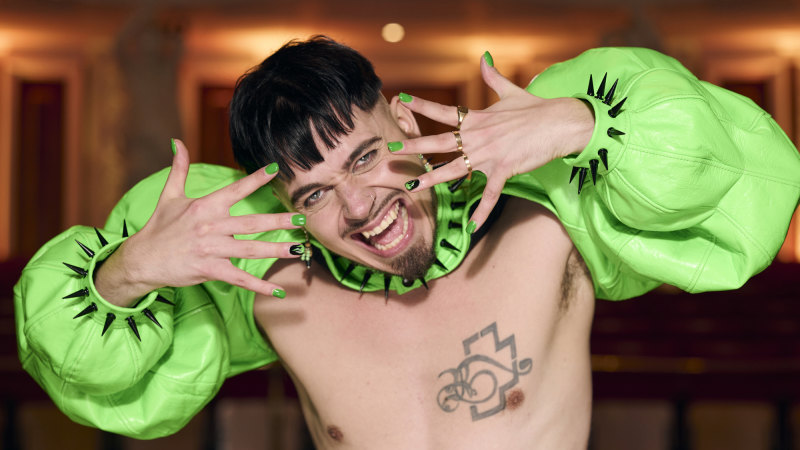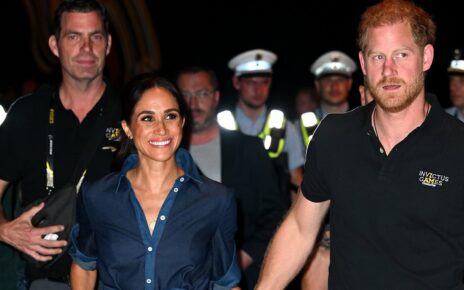Save articles for later
Add articles to your saved list and come back to them any time.
Sweden and Finland have firmed as the countries Australia must beat if it has a chance of taking the crown of the 67th annual Eurovision Song Contest in Liverpool. Both delivered competition-winning performances at Eurovision’s first semi-final overnight.
Thirty-seven countries are competing in Eurovision, a pastiche of pop, glam rock and Euro-kitsch that draws hordes of diehard fans to its host city each year, and pulls in a television audience of about 60 million viewers.
Kaarija of Finland at the Eurovision Song Contest 2023.Credit: Sarah Louise Bennett / EBU
Sweden, Finland, Croatia, Moldova, Switzerland, Czechia, Israel, Portugal, Serbia and Norway will now proceed into this weekend’s final. Malta, Latvia, Ireland, Azerbaijan and the Netherlands were cut from the competition overnight. Another eight countries will be cut in the second semi-final on Friday morning, Australian time.
Australian band Voyager did not compete overnight; they won a substantial advantage in being placed in the second semi-final, side-stepping the competition’s toughest acts in an elimination round. Voyager also have last position in Friday’s running order, so they will be fresh in the audience’s memory when telephone voting opens.
The four countries leading this year’s race to the final – Sweden (Loreen, singing Tattoo), Norway (Alessandra, singing Queen of Kings), Israel (Noa Kirel, singing Unicorn) and Finland (Kaarija, singing Cha Cha Cha) – all performed in the first semi-final overnight.
And the other three strong contenders – France (La Zarra, singing Evidemment), Spain (Blanca Paloma, singing Eaea) and Italy (Marco Mengoni, singing Due vite) – will perform for the first time in competition in the final this weekend.
Voyager must instead face some of the competition’s less likely contenders, including Austria (Teya & Salena, singing Who The Hell is Edgar?), Armenia (Brunette, singing Future Lover) and Slovenia (Joker Out, singing Carpe Diem). In an unfortunate footnote to the draw, Voyager must also compete against another Australian artist, singer Andrew Lambrou, who is representing Cyprus with Break a Broken Heart.
Compared to the politically charged environment in which the 2022 competition was held – the expulsion of Russia after its invasion of Ukraine – the 2023 competition seems uncharacteristically calm. Liverpool, the home town of the Beatles, Frankie Goes to Hollywood and Gerry & the Pacemakers, has welcomed the event with open arms.
Thirty-one countries are competing in two semi-finals; the 10 highest scoring countries from each of those progress to this weekend’s final, in which they will join the so-called “big five”: Italy, France, Germany, Spain and the UK, which automatically book their berth in the final of the competition by virtue of the fact that they are the biggest financial contributors to the organising body, the European Broadcasting Union.
The overall number of competing countries is slightly down this year; just 37, including Australia. Three Eurovision regulars, Bulgaria, Montenegro and North Macedonia, declined because of the cost. Slovakia, Turkey and Hungary took part previously but no longer participate. And Russia and Belarus remain suspended from the EBU.
Danny Estrin from Australia’s Voyager at rehearsal in Liverpool. Voyager will compete in Friday’s second semi-final.Credit: Chloe Hashemi / EBU
This is also the first year the Czech Republic has competed as Czechia; the shorter name was approved for use in 2016, but the country’s government has recently adopted its use more widely.
After so many years, the idea that Sweden remains the country to beat is almost a cliche. And yet, this year, as with many years, it is topping the speculative leaderboards on Eurovision fan sites around the world, and there is persistent buzz it will win. (Persistent buzz also has Finland, France and Norway in the top four.)
Sweden is one of Eurovision’s most successful countries, and consistently delivers top-of-the-leaderboard songs and artists; it has won Eurovision six times, beaten only by Ireland which has notched up seven wins.
Loreen from Sweden at the Eurovision Song Contest 2023.Credit: Sarah Louise Bennett / EBU
The competition is being staged in Liverpool this year, after last year’s second-placing country, the UK, stepped in and offered to host the event. The 2022 winner, Ukraine, would have hosted by Eurovision tradition, but was unable to do so because of the conflict in the country after Russia’s invasion.
The opening sequence of the semi-final rounds includes an appearance by Britain’s newly crowed King Charles III and Queen Camilla. The sequence features Britons from various walks of life being told the event is being staged in Liverpool. The sequence also features British comedian Paul O’Grady who died last month; it was O’Grady’s last appearance on film.
The two semi-finals are hosted by British singer Alesha Dixon, actress Hannah Waddingham and Ukrainian singer Julia Sanina, at Liverpool’s M&S Bank Arena. Irish television presenter Graham Norton will join the trio as a fourth host for this weekend’s final. The first semi-final also featured an appearance by three quarters of one of Eurovision’s most famous British acts, 1981 winners Bucks Fizz: Cheryl Baker, Mike Nolan and Jay Aston.
Eurovision’s semi-final No.1 will air on SBS at 7.30pm on Friday; semi-final No.2 will air live at 5am on Friday, repeated at 7.30pm on Saturday; the final will air live at 5am on Sunday, repeated at 7.30pm on Sunday.
Find out the next TV, streaming series and movies to add to your must-sees. Get The Watchlist delivered every Thursday.
Most Viewed in Culture
From our partners
Source: Read Full Article





